Motivational theories,动机理论
动机理论

A
12
(三)自我功效理论
班杜拉提出自我功效理论:人对行为决策是主动 的,人的认知变量如期待、注意和评价等在行为 决策中起着重要的作用。其中期待是决定行为的 先行因素。
A
13
几种动机理论的比较
理论 本能理论 驱动理论 诱因理论 唤醒理论 认知理论
代表人物 詹姆斯、麦独孤 赫尔 赫尔 赫布、柏林 托尔曼等
◦ P=D×H-I(P,个体的有效行为潜能;D驱力;H习 惯强度;I抑制)
A
7
3、诱因理论
观点(赫尔)
◦ 诱因是指能满足个体需要的刺激物,它具有激发或诱使 个体朝向目标的作用。
◦ 诱因有积极和消极之分。 ◦ 赫尔的修改公式:P=D×H×K-I(K,诱因) ◦ 诱因与驱力分不开,它由外在目标所激发,只有当其成
A
10
(一)期待价值理论
新行为主义者托尔曼在动物实验的基础上,提出 行为的产生是由于对某个目标的期待。
期待分为:
◦ 刺激与刺激的联系,如看见闪电,期待雷声。 ◦ 反应与刺激的联系,平时努力学习,期待考出好成绩。
A
11
(二)归因理论
归因(attribution):就是对他人或自己行为的原 因给予解释的心理过程。
为个体内在的需要时,才能推动个体的行为。
A
8
4、唤醒理论
观点(赫布和柏林)
◦ 人们总是被唤醒,并维持着生理激活的一种水平,不太 高,也不太低。
◦ 唤醒理论三原理:
一是人们偏好最佳的唤醒水平 二是简化原理 三是个人经验对于偏好有影响。
A
9
5、认识理论
期待价值理论 归因理论 自我决定论 自我效能论 成就目标理论
动机与情绪理论知识点
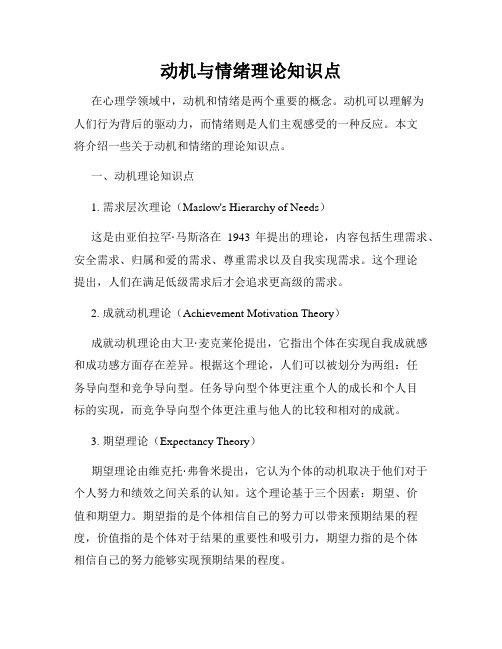
动机与情绪理论知识点在心理学领域中,动机和情绪是两个重要的概念。
动机可以理解为人们行为背后的驱动力,而情绪则是人们主观感受的一种反应。
本文将介绍一些关于动机和情绪的理论知识点。
一、动机理论知识点1. 需求层次理论(Maslow's Hierarchy of Needs)这是由亚伯拉罕·马斯洛在1943年提出的理论,内容包括生理需求、安全需求、归属和爱的需求、尊重需求以及自我实现需求。
这个理论提出,人们在满足低级需求后才会追求更高级的需求。
2. 成就动机理论(Achievement Motivation Theory)成就动机理论由大卫·麦克莱伦提出,它指出个体在实现自我成就感和成功感方面存在差异。
根据这个理论,人们可以被划分为两组:任务导向型和竞争导向型。
任务导向型个体更注重个人的成长和个人目标的实现,而竞争导向型个体更注重与他人的比较和相对的成就。
3. 期望理论(Expectancy Theory)期望理论由维克托·弗鲁米提出,它认为个体的动机取决于他们对于个人努力和绩效之间关系的认知。
这个理论基于三个因素:期望、价值和期望力。
期望指的是个体相信自己的努力可以带来预期结果的程度,价值指的是个体对于结果的重要性和吸引力,期望力指的是个体相信自己的努力能够实现预期结果的程度。
二、情绪理论知识点1. 六种基本情绪(Six Basic Emotions)根据保罗·艾克曼和沃利特·弗里曼的研究,情绪可以分为六种基本类型:喜悦、恐惧、愤怒、厌恶、悲伤和惊讶。
这些基本情绪是人类共通的,不受文化差异的影响。
2. 情绪调节理论(Emotion Regulation Theory)情绪调节理论认为,情绪不仅仅是自发产生的,个体也可以通过调节策略来主动管理和改变自己的情绪。
情绪调节策略可以分为表面策略(如冷静表情)和深层策略(如让自己平静下来)。
3. 情绪智力(Emotional Intelligence)情绪智力是指个体管理自己的情绪、理解他人的情绪以及有效应对情绪的能力。
团队协作背后的心理学原理
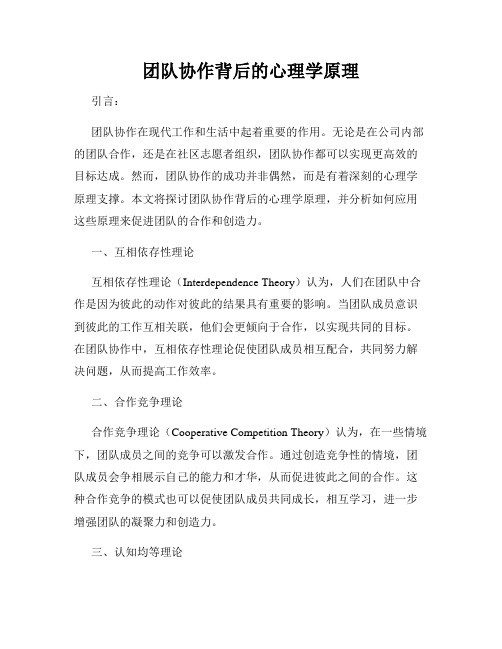
团队协作背后的心理学原理引言:团队协作在现代工作和生活中起着重要的作用。
无论是在公司内部的团队合作,还是在社区志愿者组织,团队协作都可以实现更高效的目标达成。
然而,团队协作的成功并非偶然,而是有着深刻的心理学原理支撑。
本文将探讨团队协作背后的心理学原理,并分析如何应用这些原理来促进团队的合作和创造力。
一、互相依存性理论互相依存性理论(Interdependence Theory)认为,人们在团队中合作是因为彼此的动作对彼此的结果具有重要的影响。
当团队成员意识到彼此的工作互相关联,他们会更倾向于合作,以实现共同的目标。
在团队协作中,互相依存性理论促使团队成员相互配合,共同努力解决问题,从而提高工作效率。
二、合作竞争理论合作竞争理论(Cooperative Competition Theory)认为,在一些情境下,团队成员之间的竞争可以激发合作。
通过创造竞争性的情境,团队成员会争相展示自己的能力和才华,从而促进彼此之间的合作。
这种合作竞争的模式也可以促使团队成员共同成长,相互学习,进一步增强团队的凝聚力和创造力。
三、认知均等理论认知均等理论(Theory of Cognitive Equality)认为,团队成员在合作中感到平等和被尊重是重要的。
当团队成员感到彼此的认知与决策被平等看待时,他们更有动力参与到团队的活动中。
团队领导者在协调团队合作时,应注意平等对待每个团队成员的意见,从而在心理上建立互相尊重和认同感。
四、沟通与共享知识沟通和共享知识是团队协作的基石。
团队成员之间的有效沟通可以避免误解和冲突,并帮助团队迅速解决问题。
此外,团队成员之间的共享知识可以加速问题的解决过程,并促进团队的创新和发展。
在团队协作中,及时有效的沟通和分享知识都是至关重要的。
五、动机理论动机理论(Motivational Theory)探讨了人们参与活动的内在动机和外在激励因素。
在团队协作中,团队领导者可以通过激励措施来激发团队成员的积极性和创造力。
修改名词: 大学生心理学必修2知识点总结
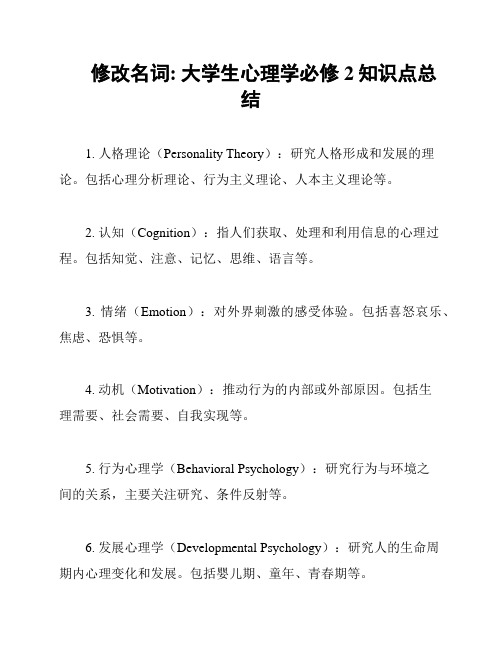
修改名词: 大学生心理学必修2知识点总结1. 人格理论(Personality Theory):研究人格形成和发展的理论。
包括心理分析理论、行为主义理论、人本主义理论等。
2. 认知(Cognition):指人们获取、处理和利用信息的心理过程。
包括知觉、注意、记忆、思维、语言等。
3. 情绪(Emotion):对外界刺激的感受体验。
包括喜怒哀乐、焦虑、恐惧等。
4. 动机(Motivation):推动行为的内部或外部原因。
包括生理需要、社会需要、自我实现等。
5. 行为心理学(Behavioral Psychology):研究行为与环境之间的关系,主要关注研究、条件反射等。
6. 发展心理学(Developmental Psychology):研究人的生命周期内心理变化和发展。
包括婴儿期、童年、青春期等。
7. 社会心理学(Social Psychology):研究个体在社会环境中的心理过程和行为。
包括群体行为、社会认知、人际关系等。
8. 心理测量(Psychological Measurement):使用科学方法来测量和评估心理现象。
包括问卷调查、实验方法等。
9. 心理疾病(Psychological Disorders):与心理健康相对立的异常心理状态。
包括抑郁症、焦虑症、精神分裂症等。
10. 研究理论(Learning Theory):研究人类获取新知识和技能的过程。
包括经典条件作用、操作条件作用等。
这些是大学生心理学必修2课程中的主要知识点总结。
通过学习和理解这些名词,我们能够更好地了解心理学的基本概念和理论,从而增强对大学生心理健康的认知和关注。
动机理论的解释
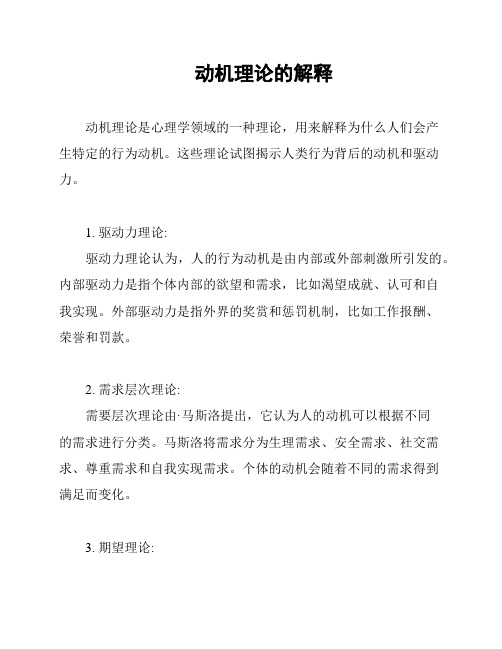
动机理论的解释
动机理论是心理学领域的一种理论,用来解释为什么人们会产
生特定的行为动机。
这些理论试图揭示人类行为背后的动机和驱动力。
1. 驱动力理论:
驱动力理论认为,人的行为动机是由内部或外部刺激所引发的。
内部驱动力是指个体内部的欲望和需求,比如渴望成就、认可和自
我实现。
外部驱动力是指外界的奖赏和惩罚机制,比如工作报酬、
荣誉和罚款。
2. 需求层次理论:
需要层次理论由·马斯洛提出,它认为人的动机可以根据不同
的需求进行分类。
马斯洛将需求分为生理需求、安全需求、社交需求、尊重需求和自我实现需求。
个体的动机会随着不同的需求得到
满足而变化。
3. 期望理论:
期望理论由维克托·维尔斯提出,它认为人的动机是基于期望的。
个体会在行动前对行动结果的期望进行评估,从而决定是否去追求这个目标。
这个理论强调了个体对于达成目标的信心和能力评估的重要性。
4. 自我决定理论:
自我决定理论由理查德·瑞恩和爱德华·迪西发展而来,它认为人的动机是基于自我决定的。
这个理论强调个体对于自己行为的自主性和内在动机的重要性。
个体会追求符合自己兴趣、价值观和目标的行为。
动机理论的解释对于理解个体的行为动机和激励机制具有重要意义。
了解这些理论可以帮助我们理解人们的行为动机,从而更好地管理和激励团队成员,以达到组织的目标。
动机理论
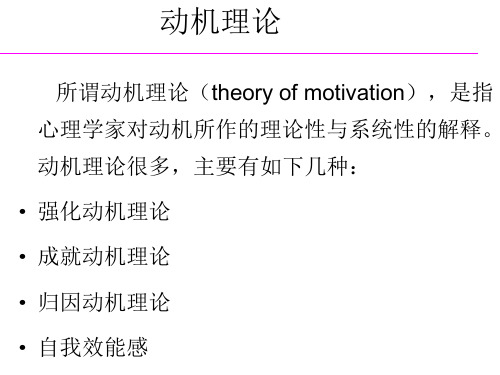
成功的经验提高个人的志向水平,失败的经验降低个 人的志向水平。 ⑵ 与个体对成败的归因有关。 ⑶与个体幼年时期的家庭教育有关。
(一)频繁体验挫折 学习动机不强、学习态度不端正、基础差、方法不当等等。这 些因素就导致了成绩差的学生往往是各门功课都不好。这些学 生在各种考试中总是频繁地体验到挫折。由于他们成绩不好, 渐渐与各种“好事”,如评选优秀学生、参加各种竞赛和社会 活动等无缘,这样就更增添了他们的受挫感。 (二)产生消极认知 如果一个学生想改变自己成绩不好的状况,必然就要付出更多 的努力。但是,学生往往会发现,虽然在一段时间内,自己用 功了、努力了,但考试成绩还是不理想,自己的努力没有得到 老师的承认和肯定,依然要受惩罚、挨批评。于是他们渐渐对 自己的能力产生了怀疑,甚至认为自己对学习成绩是无法改变、 无力控制的。 (三)产生无助感 一旦学生认为自己的努力没有结果,自己对学习成绩无法控制, 就会体会到一种无能为力的感觉。此时,老师的批评、家长的 责骂、同学的轻视更加剧了学生的失控感的形成,是他们渐渐 产生了“习得性无助感”。
(一)支持和鼓励学生 (二)看到学生的点滴进步 (三)提高学生的挫折忍受力 (四)归因训练
2.1 韦纳的归因理论介绍
归因的三维结构模型
部位 稳定性 控制性
稳 定 可控
外因 不可控
内因
不 稳 定
归因理论的应用价值
了解心理与行为的因果关系 根据行为者当前的归因倾向预测他以后的动机 归因训练有助于提高自我认识
塞利格曼和梅尔于1967年用狗做的一项经典实验。实验中, 心理学家把狗关在一个笼子里,只要铃声一响,就给狗以 难受的电击。由于狗被关在封闭的笼子里,所以它无法逃 避这种电击。多次这样的实验之后,心理学家改变了实验 条件,他们在给狗以电击之前先把笼门打开。结果却发现, 在铃声响起后,狗不但不会从笼门逃跑,反而不等电击出 现就先倒在底下开始呻吟和颤抖。本来已经可以轻松逃避 电击的狗却在敞开的笼子中绝望的等待痛苦的来临。心理 学家们把这种在受到多次挫折之后产生的对应付情境的无 能为力感叫做习得性无助感或习得性绝望感。
Motivational Control Theory 动机控制理论
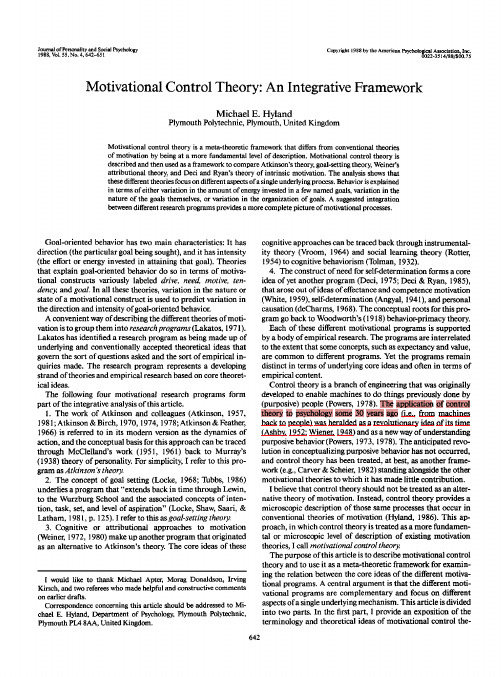
I would like to thank Michael Apter, Morag Donaldson, Irving Kirsch, and two referees who made helpful and constructive comments on earlier drafts. Correspondence concerning this article should be addressed to Michael E. Hyland, Department of Psychology, Plymouth Polytechnic, Plymouth PL4 8AA, United Kingdom.
cognitive approaches can be traced back through instrumentality theory (Vroom, 1964) and social learning theory (Rotter, 1954) to cognitive behaviorism (Tolman, 1932). 4. The construct of need for self-determination forms a core idea of yet another program (Deci, 1975; Deci & Ryan, 1985), that arose out of ideas of effectance and competence motivation (White, 1959), self-determination (Angyal, 1941), and personal causation (deCharms, 1968). The conceptual roots for this program go back to Woodworth's (1918) behavior-primacy theory. Each of these different motivational programs is supported by a body of empirical research. The programs are interrelated to the extent that some concepts, such as expectancy and value, are common to different programs. Yet the programs remain distinct in terms of underlying core ideas and often in terms of empirical content. Control theory is a branch of engineering that was originally developed to enable machines to do things previously done by (purposive) people (Powers, 1978). The application of control theory to psychology some 30 years ago (i.e., from machines back to people) was heralded as a revolutionary idea of its time (Ashby, 1952; Wiener, 1948) and as a new way of understanding purposive behavior (Powers, 1973,1978). The anticipated revolution in conceptualizing purposive behavior has not occurred, and control theory has been treated, at best, as another framework (e.g., Carver & Scheier, 1982) standing alongside the other motivational theories to which it has made little contribution. I believe that control theory should not be treated as an alternative theory of motivation. Instead, control theory provides a microscopic description of those same processes that occur in conventional theories of motivation (Hyland, 1986). This approach, in which control theory is treated as a more fundamental or microscopic level of description of existing motivation theories, I call motivational control theory. The purpose of this article is to describe motivational control theory and to use it as a meta-theoretic framework for examining the relation between the core ideas of the different motivational programs. A central argument is that the different motivational programs are complementary and focus on different aspects of a single underlying mechanism. This article is divided into two parts. In the first part, I provide an exposition of the terminology and theoretical ideas of motivational control the642
Motivationaltheories,动机理论
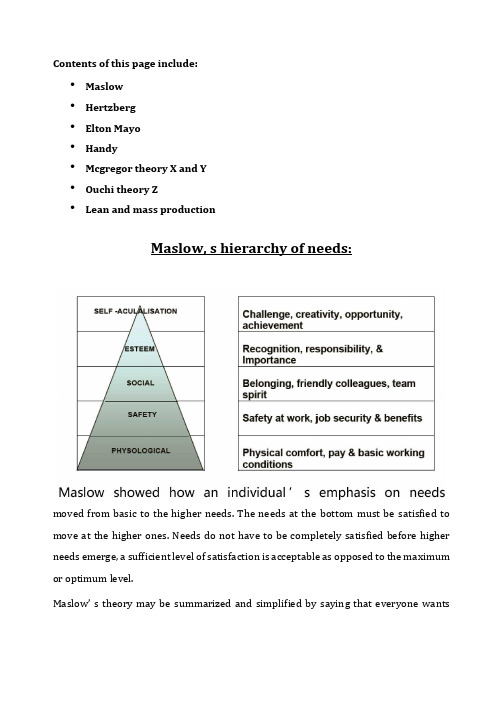
Contents of this page include:•Maslow•Hertzberg•Elton Mayo•Handy•Mcgregor theory X and Y•Ouchi theory Z•Lean and mass productionMaslow, s hierarchy of needs:moved from basic to the higher needs. The needs at the bottom must be satisfied to move at the higher ones. Needs do not have to be completely satisfied before higher needs emerge, a sufficient level of satisfaction is acceptable as opposed to the maximum or optimum level.Maslow’ s theory may be summarized and simplified by saying that everyone wa ntscertain things throughout life, and these things can be placed in five ascending categories namely:Basic or physiological needs: the things needed to stay alive: food, shelter and clothing. Such needs can be satisfied by money.Safety or security needs: people want protection against, unemployment, retirement as well as being safeguarded against unfair treatment. These needs can be satisfied by the rules of employment i.e pension scheme, sick fund, employment legislation.Social needs: the vast majority of people want to be part of a group and it is only through group activity that this need can be satisfied. Thus it is up to the organization to make the employee feel part of a group.Ego or Esteem needs: e.g. can include employee being asked to lead a group in a project. This enables the employee to think well of himself and in his abilities. This can be satisfied if the say or suggestion of the employee is taken into account and/or he is asked to lead or be part of an important task.Self-actualization or self-fulfillment needs: this is quite the need to achieve something worthwhile in life. It is a need that is satisfied only by continuing success, for example opening and running a new office.EVALUATION OF MASLOW:The significance of maslow’ s hierarchy of needs is that if underlines the relative importance of money. Status gives little satisfaction to a person desperate for food and shelter.On the other hand it demonstrates that money alone is not enough, and indeed as basic needs are satisfied people are likely to concentrate their attentions on social and ego needs.Herzberg’ s theory of motivation:Herzberg attempted to find out what motivated people at work. He developed the two-factor theory that was based on the idea that motivation is based on two needs, namely hygiene factors and motivational factors.Hygiene factors: are those that have to do with non-job related features such as the working environment.Motivational factors: are those concerned with a need for personal development.Hygiene factors: factors that need to be met to prevent dissatisfaction. Will not motivate in themselves, they are concerned with extrinsic factors associated with thejob itself but are not directly a part of it. The important fact to remember is that attention to these hygiene factors prevents dissatisfaction but does not necessarily provide positive motivation.•Pay•Conditions•Company policy•Relationships with higher levels, such as management•Treatment at work•Inability to develop•Feelings of inadequacyMotivators: factors which motivate: the main motivation factor are not in the environment but in the intrinsic value and satisfaction gained from the job itself. Motivation factors include:•Sense of achievement•Chance of promotion•Chance of improvement•Recognition of effort•Responsibility•Nature of job itselfElton Mayo (Hawthorne Studies)Mayo’ s most important contribution was to identify the basis of work satisfaction as non-economic and to connect it more with the interest taken in the worker ' s performance than with the financial reward.Okay here’ s what happened in plain simple words:• A test was conducted on 6 women which lasted for five years•The test was conducted so as to observe the effect on output and morale of various changes in working conditions.•Initially, an incentive payment scheme was introduced; then rest periods in different forms. Changes were made in the hours of work etc.•CONCLUSION: it was found that whatever changes were made including a return to the original conditions, output still rose!•The output recorded over time kept on increasing.Evaluation: it was apparent that the changes in working conditions could not account for the increase in output - this was due to the enhanced work satisfaction that the girls enjoyed, the development of personal friendships, and a new social atmosphere, which brought a marked change in their attitude towards work.Mcgregor, s theory X and theory Y:Mcgregor’ s theories:Theory X: assumes that people dislike work and responsibility. Therefore they must be coerced, controlled, directed or threatened with punishment to get them to make an effort towards achievement of organizational objectives. However modern employment laws have made this difficult for managers. For this reason a 'carrot’ approach is used. People have to be persuaded to carry out tasks by promises or rewards. In many ways this is similar to Taylor’ s view.Theory Y:assumes that most people are motivated by those things at the top of Maslow’ s hierarchy. In other words, people are responsible, committ ed and enjoy having control over work. Most people, given the opportunity, will get involved in work and contribute towards the solution of a problem that may arise.IN OTHER WORDS:THEORY X is pessimistic and rigid. Control is primarily external i.e. imposed on the subordinate by the superior.THEORY Y is optimistic, dynamic and flexible, with an emphasis o self-direction and the integration of individual needs with organizational demands.Ouchi theory ZIn theory Z there is an emphasis on the interpersonal skills that form the basis of group working, where decision making is by consensus, but responsibility remains with the individual.There is emphasis on building trust through informal and democratic relationships.The characteristics of the theory z organizations are:•Long term employment•Slow evaluation and promotion•Moderately specialized careers•Consensual decision making•Individual responsibility- this could mean giving greater responsibility lower down the line•Concern for the employeeLEAN PRODUCTIONLean production is divided into the following sectors:•Kaizen•Just in time manufacturing•Time based management •Empowerment •TeamworkingKaizen is perhaps the most concept in Japanese management. It means continuous improvement. In western businesses productivity remains the same for long periods of time, then suddenly rises. The increase is followed by another period of stability, before another rise. Increases in productivity may result from new working practices or new technology. The dotted line below shows the Japanese approach. Improvements are continuous. They result from changes in production techniques.continuousimprovementsone ofjmprovementstimethe kaizen is said to be an umbrella concept. A wide range of different production techniques and working practices must be carried out for it to be effective. These include:•Zero defect policies•Total quality management•Quality control circles•Automation•Just in timeIt is difficult for workers in the business to look for continuous improvement all the time. In order to solve this problem a system was introduced namely PDCA (plan, do, check, action)Plan: business must identify where improvement is needed. Data must be gathered and used to develop a plan which will result in improvement.Do: once the plan has been finalized it must be carried out.Check: the next stage in the cycle is to check whether or not there has been an improvement.Action: if the plan has been successful, it must be introduced in all parts of the business.Just in time manufacturing:JIT: just in time manufacturing is an important part of lean production. It is defined as for example in any manufacturing and selling organization: ‘raw materials being delivered JIT to be made into parts, parts were delivered JIT to be made into goods and goods were produced and delivered JIT to be sold./Advantages:•It improves cash flow as money is not tied up in stock•The system reduces waste•Since no stock is held the excess factory space can be used for something else •Links with and the control of suppliers is improvedDisadvantages:• A lot of faith is placed in the reliability and flexibility of suppliers•Increased order costs•Advantages of bulk discounts is lost•Difficult to cope up with sharp increases in demandTime-based management:Time based mgt involves reducing the amount of time businesses take carrying out certain tasks, such as launching new products or cutting lead times in production. Time based mgt is a feature of lean production because it involves eliminating a type of waste i.e. time.Advantages:•Customers will benefit. A wider range of products will be available and there will be faster delivery times.•Increased efficiency will benefit the company by improving it’ s image in the eyes of the people•The time spent on range of production tasks is reduced. This helps to improve productivity and reduce unit costs.Empowerment:Empowerment involves giving employees the power to make decisions in a business. The aim of empowerment is to give employees more control over their own work conditions.Businesses have now learnt that efficiency will improve if workers are given theopportunity to involve themselves in decision making. Workers will be better motivated and the business may gain from the creativity of its workers.Empowerment is not without difficulties. Some workers may not be able to make their own decisions and training may be required to teach them such skills. Mangers may resent giving up authority. Some staff may even abuse their power to make decisions.Team working:A growing number of businesses are introducing team working. This involves dividing the workforce into fairly small groups. Each team will focus on particular areas of production and team members will have the same common aims.Effective teamworking requires cooperation between workers and management. Both the business and employees can benefit from team working. Workers should develop relationships with colleagues and a team spirit which may improve motivation and productivity. Flexibility will improve. For example team members might be more willing to cover for an absent colleague.MASS production。
动机理论-PPT精品文档
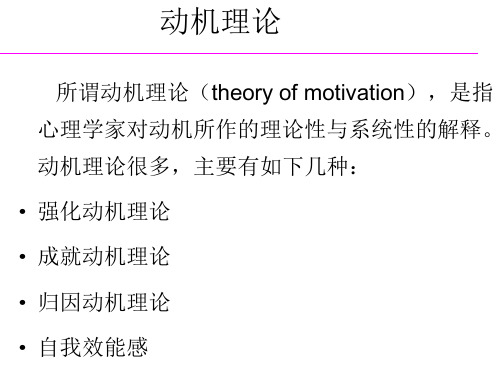
有人做过一个心理学实验:将两只老鼠绑在一起,给它们过电。 老鼠当然不愿意,不停挣扎。不过其中一只老鼠无论怎么做也不 能逃避电击的痛苦,遭受打击成了它的宿命;而另一只则比较幸 运,如果它在挣扎中碰巧用爪子按到了一个开关,电击就会停止。 由于两只老鼠是绑在一起的,另外一只老鼠也可以因此借光缓口 气。但是,很快电击又会开始,除非再次按下开关,否则折磨将 无休无止。但老鼠也是聪明的动物,要不也不会和人类一起生活 了这么多年而没有被消灭掉。比较幸运的老鼠很快学会用按动开 关来避免电击,而另外那只老鼠,虽然遭受电击的水平相同,但 他的幸运只能源于伙伴的行动,自己对电击的痛苦却是无可奈何 的。换言之,在两只老鼠中,一只老鼠知道,只要按动按钮,就 可以逃避电击;另一只老鼠,对所有的电击没有控制能力,只能 听天由命。 最后的结果是:幸运的可以按动开关的那只老鼠在实验之后皮毛 依然光滑,胃口也不错,很快从过去的折磨中完全恢复过来了; 但另一只,则在放出来之后食欲不振,情绪低落,在很短的时间 内便死去了。心理学家得出的结论是:受到折磨的动物死亡原因 不是生理上的痛楚,而是无助的情绪和控制感缺乏的原因。
第一种:正强化,又称积极强化。当人们采取某种行 为时,能从他人那里得到某种令其感到愉快的结果,这种 结果反过来又成为推进人们趋向或重复此种行为的力量。
第二种:负强化,又称消极强化。它是指通过某种不符
合要求的行为所引起的不愉快的后果,对该行为予以否定。 第三种:自然消退,又称衰减。它是指对原先可接受的 某种行为强化的撤消。由于在一定时间内不予强化,此行 为将自然下降并逐渐消退。
二分法行为的归因理论 一是:环境归因(situational attribution),即
将行为原因归为环境,如将行为的原因归为
他人的影响、奖励、运气、工作难易等都是 环境归因。
对四种学习动机理论的评析

对四种学习动机理论的评析学习动机理论是心理学分支教育心理学领域中最重要的理论之一,它关乎学习能力的发展和发挥作用,对学习质量和学习成果也具有重要意义。
学习动机理论可以大致分为四种:社会学习理论、情绪性学习理论、行为动机理论和认知动机理论。
社会学习理论(Social Learning Theory)的基本观点是,人是一个被社会环境影响的有机整体,他的行为是受外界刺激和社会环境影响而发展的。
荣格认为,行为是对社会环境的反映,人性深处存在着一种认知与行为相结合的学习,也就是所谓的“学习态度”,这就是“社会学习”的概念。
情绪性学习理论(Affective Learning Theory)的基本观点是以情感为基础的学习,这种学习与认知无关,而是以感情或态度为基础的学习。
情绪性学习主要是对学习情境的一种感受,这种感受会影响学习的动机,促进学习的持久性和激励性。
情绪性学习主要是以积极的情感来激励学习,可以激发学习者的积极性和学习兴趣,也可以帮助学习者建立正确的学习态度。
行为动机理论(Behavioral Motivation Theory)的基本观点是按照建立了特定奖励与处罚机制的要求,通过对学习者进行激励和制约来调节学习行为,通过反复操练、报酬或惩罚等方式,使其形成良好的学习习惯,从而达到学习的目的。
这一理论认为,通过反复的正面和负面的奖励刺激,可以调节和控制学习者的行为,从而提高学习的效率。
它基于对人的行为本质的分析,以得到回报的可能性来引导和影响学习者的行为。
认知动机理论(Cognitive Motivation Theory)更加重视学习者主观意义上的情感、态度和需求,它强调学习者主观意识认识活动中所包括的学习动机,重点在于探讨学习者不同阶段的心理行为,以及学习者在同一阶段中对学习的态度和需求。
它特别重视学习者的心理行为的本质,倾向于从学习者的内心出发,研究学习者内心与外部环境的相互影响,从而达到因材施教的效果。
动机理论

●精神分析的动机理论(Drive Theory in In Freudian psychoanalysis)Freud,1915弗洛伊德提出人类体验到的驱力来源于生的本能(包括性欲),他称之为利比多(libido),和死的本能(包括敌对行为)他称之为塔纳托斯(Thanatos)。
他认为本能的冲动指引心理能量去满足身体的需要,如果这种能量没有得到释放的话,就会产生紧张,这种紧张驱使人们朝向减少和消除紧张的活动或事物。
弗洛伊德认为生与死的本能是在潜意识水平下起作用的。
然而它们对有意识的思想、情感和行为的影响是很深的,因为本能驱动人们做出重要的生活选择。
●驱力与诱因(Drive and Incentive)Hull,1943●内驱力降低理论(Drive-reduction Theory)美国心理学家赫尔提出了内驱力降低理论。
他认为最重要的行为是由内驱力而激发的。
驱力(drive)是一种内部的状态,它是对动物的生理需要做出的反应。
生物体就其本身条件来说如体温和能量供应等,会寻求维持一种平衡状态,或者说动态平衡(homeostasis)。
当某种需要破坏了平衡或产生了某种心理上的紧张,驱力就会被唤醒。
这些驱力反过来促使生物体采取消除紧张的行为;当这些驱力得到满足或消除时——即动态平衡又得到恢复——生物体就会停止这种行为。
●诱因理论(Incentive Theory)消除紧张无法解释所有被激励的行为。
例如,吃饱了的动物在看到另一个动物在进食,将会重新吃食物。
因此行为不仅仅是由内部驱力所激发的,还由诱因(incentive)所驱使,即外部的刺激和奖励,他们与生理上的需要并无直接联系。
诱因理论强调了外部刺激引起动机的重要作用,认为诱因能够唤起行为并指导行为。
●认知失调理论(Cognitive Dissonance Theory)Festinger,1957费斯廷格对认知失调(cognitive dissonance),即与我们通常的(一般是积极的)自我概念相违背的行为所导致的不适感展开了精确的研究。
Motivationaltheories,动机理论
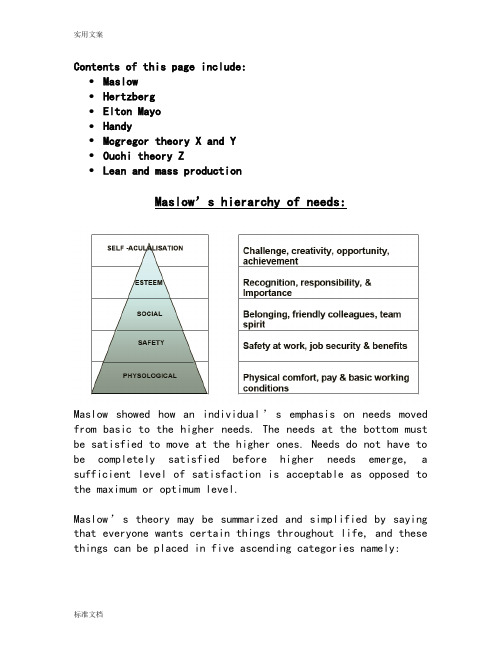
Contents of this page include:∙Maslow∙Hertzberg∙Elton Mayo∙Handy∙Mcgregor theory X and Y∙Ouchi theory Z∙Lean and mass productionMaslow’s hierarchy of needs:Maslow showed how an individual’s emphasis on needs moved from basic to the higher needs. The needs at the bottom must be satisfied to move at the higher ones. Needs do not have to be completely satisfied before higher needs emerge, a sufficient level of satisfaction is acceptable as opposed to the maximum or optimum level.Maslow’s theory may be summarized and simplified by saying that everyone wants certain things throughout life, and these things can be placed in five ascending categories namely:Basic or physiological needs: the things needed to stay alive: food, shelter and clothing. Such needs can be satisfied by money.Safety or security needs: people want protection against, unemployment, retirement as well as being safeguarded against unfair treatment. These needs can be satisfied by the rules of employment i.e pension scheme, sick fund, employment legislation.Social needs: the vast majority of people want to be part of a group and it is only through group activity that this need can be satisfied. Thus it is up to the organization to make the employee feel part of a group.Ego or Esteem needs: e.g. can include employee being asked to lead a group in a project. This enables the employee to think well of himself and in his abilities. This can be satisfied if the say or suggestion of the employee is taken into account and/or he is asked to lead or be part of an important task.Self-actualization or self-fulfillment needs: this is quite the need to achieve something worthwhile in life. It is a need that is satisfied only by continuing success, for example opening and running a new office.EVALUATION OF MASLOW:The significance of maslow’s hierarchy of needs is that if underlines the relative importance of money. Status gives little satisfaction to a person desperate for food and shelter.On the other hand it demonstrates that money alone is not enough, and indeed as basic needs are satisfied people arelikely to concentrate their attentions on social and ego needs.Herzberg’s theory of motivation:Herzberg attempted to find out what motivated people at work. He developed the two-factor theory that was based on the idea that motivation is based on two needs, namely hygiene factors and motivational factors.Hygiene factors: are those that have to do with non-job related features such as the working environment.Motivational factors: are those concerned with a need for personal development.Hygiene factors: factors that need to be met to prevent dissatisfaction. Will not motivate in themselves, they are concerned with extrinsic factors associated with the job itself but are not directly a part of it. The important fact to remember is that attention to these hygiene factors prevents dissatisfaction but does not necessarily provide positive motivation.Pay∙Conditions∙Company policy∙Relationships with higher levels, such as management∙Treatment at work∙Inability to develop∙Feelings of inadequacyMotivators: factors which motivate: the main motivation factor are not in the environment but in the intrinsic value and satisfaction gained from the job itself. Motivation factors include:∙Sense of achievement∙Chance of promotion∙Chance of improvement∙Recognition of effort∙Responsibility∙Nature of job itselfElton Mayo (Hawthorne Studies)Mayo’s most important contribution was to identify the basis of work satisfaction as non-economic and to connect it more with the interest taken in the worker’s performance than with the financial reward.Okay here’s what happened in plain simple words:∙ A test was conducted on 6 women which lasted for five years ∙The test was conducted so as to observe the effect on output and morale of various changes in working conditions. ∙Initially, an incentive payment scheme was introduced; then rest periods in different forms. Changes were made in the hours of work etc.∙CONCLUSION: it was found that whatever changes were made including a return to the original conditions, output still rose!∙The output recorded over time kept on increasing.Evaluation: it was apparent that the changes in working conditions could not account for the increase in output –this was due to the enhanced work satisfaction that the girls enjoyed, the development of personal friendships, and a new social atmosphere, which brought a marked change in their attitude towards work.Mcgregor’s theories:Theory X: assumes that people dislike work and responsibility. Therefore they must be coerced, controlled, directed or threatened with punishment to get them to make an effort towards achievement of organizational objectives. However modern employment laws have made this difficult for managers. For this reason a ‘carrot’ approach is used. People have to be persuaded to carry out tasks by promises or rewards. In many ways this is similar to Taylor’s view.Theory Y: assumes that most people are motivated by those things at the top of Maslow’s hierarchy. In other words, people are responsible, committed and enjoy having control over work. Most people, given the opportunity, will get involved in work and contribute towards the solution of a problem that may arise.IN OTHER WORDS:THEORY X is pessimistic and rigid. Control is primarily external i.e. imposed on the subordinate by the superior.THEORY Y is optimistic, dynamic and flexible, with an emphasis o self-direction and the integration of individual needs with organizational demands.Ouchi theory ZIn theory Z there is an emphasis on the interpersonal skills that form the basis of group working, where decision making is by consensus, but responsibility remains with the individual.There is emphasis on building trust through informal and democratic relationships.The characteristics of the theory z organizations are:∙Long term employment∙Slow evaluation and promotion∙Moderately specialized careers∙Consensual decision making∙Individual responsibility- this could mean giving greater responsibility lower down the line∙Concern for the employeeLEAN PRODUCTIONLean production is divided into the following sectors: ∙Kaizen∙Just in time manufacturing∙Time based management∙Empowerment∙TeamworkingKaizen is perhaps the most concept in Japanese management. It means continuous improvement. In western businesses productivity remains the same for long periods of time, then suddenly rises. The increase is followed by another period of stability, before another rise. Increases in productivity may result from new working practices or new technology. The dotted line below shows the Japanese approach. Improvements are continuous. They result from changes in production techniques.the kaizen is said to be an umbrella concept. A wide range of different production techniques and working practices must be carried out for it to be effective. These include:∙Zero defect policies∙Total quality management∙Quality control circles∙Automation∙Just in timeIt is difficult for workers in the business to look for continuous improvement all the time. In order to solve this problem a system was introduced namely PDCA (plan, do, check, action)Plan: business must identify where improvement is needed. Data must be gathered and used to develop a plan which will result in improvement.Do: once the plan has been finalized it must be carried out. Check: the next stage in the cycle is to check whether or not there has been an improvement.Action: if the plan has been successful, it must be introduced in all parts of the business.Just in time manufacturing:JIT: just in time manufacturing is an important part of lean production. It is defined as for example in any manufacturing and selling organization: ‘raw materials being delivered JIT to be made into parts, parts were delivered JIT to be made into goods and goods were produced and delivered JIT to be sold.’Advantages:∙It improves cash flow as money is not tied up in stock∙The system reduces waste∙Since no stock is held the excess factory space can be used for something else∙Links with and the control of suppliers is improvedDisadvantages:∙ A lot of faith is placed in the reliability and flexibility of suppliers∙Increased order costs∙Advantages of bulk discounts is lost∙Difficult to cope up with sharp increases in demandTime-based management:Time based mgt involves reducing the amount of time businesses take carrying out certain tasks, such as launching new products or cutting lead times in production. Time based mgt is a feature of lean production because it involves eliminating a type of waste i.e. time.Advantages:∙Customers will benefit. A wider range of products will be available and there will be faster delivery times.∙Increased efficiency will benefit the company by improving it’s image in the eyes of the people∙The time spent on range of production tasks is reduced.This helps to improve productivity and reduce unit costs.Empowerment:Empowerment involves giving employees the power to make decisions in a business. The aim of empowerment is to give employees more control over their own work conditions.Businesses have now learnt that efficiency will improve if workers are given the opportunity to involve themselves in decision making. Workers will be better motivated and the business may gain from the creativity of its workers.Empowerment is not without difficulties. Some workers may not be able to make their own decisions and training may be required to teach them such skills. Mangers may resent giving up authority. Some staff may even abuse their power to make decisions.Team working:A growing number of businesses are introducing team working. This involves dividing the workforce into fairly small groups. Each team will focus on particular areas of production and team members will have the same common aims.Effective teamworking requires cooperation between workers and management. Both the business and employees can benefit from team working. Workers should develop relationships with colleagues and a team spirit which may improve motivation and productivity. Flexibility will improve. For example team members might be more willing to cover for an absent colleague.MASS production。
motivational model动机模型

motivational model动机模型以下是一篇关于动机模型的文章,探讨了动机的不同类型和影响因素。
文章从基本定义开始,逐步解释了不同的动机理论,并探讨了如何激发和维持动机的方法。
【引言】动机是人类行为背后的推动力量。
无论是个人目标的实现还是组织的成功,都需要良好的动机。
了解和理解动机的不同类型和影响因素对于有效地激发和维持动力至关重要。
本文将介绍一些著名的动机模型,并探讨如何应用这些模型来激发动力。
【第一部分:动机的基本理论】动机是指个体为达到特定目标而产生的内部驱动力。
为了更好地理解动机,我们需要了解不同的动机理论。
最早的动机理论之一是亚伯拉罕·马斯洛的需求层次理论,他认为人们根据满足不同的需求而产生动机。
这些需求按重要性和紧迫性分为五个层次,从基本的生理需求到自我实现的需求。
另一个著名的动机理论是弗雷德里克·赫兹伯格的双因素理论,他认为满足了基本的生理和安全需求后,个体追求的是增长和充实的机会。
【第二部分:激发动机的方法】了解动机的不同类型后,我们可以探讨如何激发和维持动机。
其中一个方法是设定明确的目标。
给予个体明确的目标可以帮助他们有明确的方向,并提供成功的标准。
此外,建立一个支持性的环境也是激发动机的关键因素。
个体需要感到他们在追求目标的过程中得到支持和赞赏。
积极的反馈和奖励也是激发动机的重要手段。
【第三部分:维持动机的方法】激发动机只是开始,要保持动机并持续前进同样重要。
个体需要感到他们的工作有意义,并认识到它与整体组织目标的联系。
提供发展和成长的机会也是维持动机的重要方面。
个体应该能够在他们的工作中不断学习和成长,以实现自我实现的需求。
【第四部分:动机的影响因素】动机的激发和维持不仅仅取决于个体,还受到很多外部因素的影响。
工作环境、组织文化和领导风格等都可以影响个体的动机。
一个激励性的工作环境应该提供有挑战性的任务和充满机会的工作。
组织文化应该强调个体的发展和成长,而领导风格应该是支持性和鼓励性的。
动机与情绪理论知识点总结
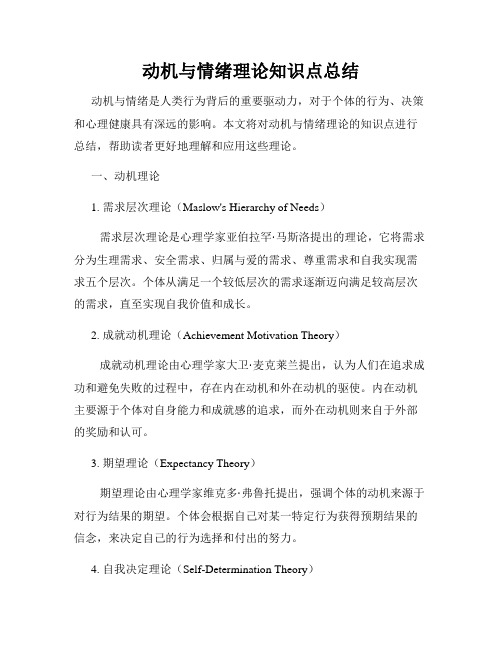
动机与情绪理论知识点总结动机与情绪是人类行为背后的重要驱动力,对于个体的行为、决策和心理健康具有深远的影响。
本文将对动机与情绪理论的知识点进行总结,帮助读者更好地理解和应用这些理论。
一、动机理论1. 需求层次理论(Maslow's Hierarchy of Needs)需求层次理论是心理学家亚伯拉罕·马斯洛提出的理论,它将需求分为生理需求、安全需求、归属与爱的需求、尊重需求和自我实现需求五个层次。
个体从满足一个较低层次的需求逐渐迈向满足较高层次的需求,直至实现自我价值和成长。
2. 成就动机理论(Achievement Motivation Theory)成就动机理论由心理学家大卫·麦克莱兰提出,认为人们在追求成功和避免失败的过程中,存在内在动机和外在动机的驱使。
内在动机主要源于个体对自身能力和成就感的追求,而外在动机则来自于外部的奖励和认可。
3. 期望理论(Expectancy Theory)期望理论由心理学家维克多·弗鲁托提出,强调个体的动机来源于对行为结果的期望。
个体会根据自己对某一特定行为获得预期结果的信念,来决定自己的行为选择和付出的努力。
4. 自我决定理论(Self-Determination Theory)自我决定理论由心理学家爱德华·迪西和理查德·瑞安提出,认为人们具有内在的动机和追求自主性、能力和相关性的需要。
当个体能够满足这三个基本需要时,其自我动机和心理健康将得到提高。
二、情绪理论1. 六种基本情绪根据心理学家保罗·艾克曼和威廉·弗里森提出的情绪理论,人类情绪可以归纳为六种基本情绪:快乐、悲伤、愤怒、惊讶、恐惧和厌恶。
这些情绪是人类进化的产物,对于个体的生存和适应具有重要意义。
2. 情绪表达与认知人类通过面部表情、声音、身体语言等方式表达情绪。
此外,个体在感知和理解情绪时,会受到自身经验、文化和环境的影响,产生不同的情绪认知。
动机理论概念术语-3

动机理论概念术语-31. 动机(motivation)动机是推动人从事某种活动,并朝一个方向前进的内部动力。
是为实现一定目的而行动的原因。
动机是个体的内在过程,行为是这种内在过程的表现。
引起动机的内在条件是需要,引起动机的外在条件是诱因。
2. 自我效能感(self-efficacy)这一概念是班杜拉最早提出的,自我效能感指个体对自己是否有能力为完成某一行为所进行的推测与判断。
这种理论认为,即便人的行为没有对自己产生强化,但由于人对行为结果所能带来的功效产生期望,可能会主动性的进行那一活动。
自我效能感理论克服了传统心理学重行轻欲、重知轻情的倾向,日益把人的需要、认知、情感结合起来研究人的动机,具有极大的科学价值。
但迄今仍然没有形成一个比较完整的,统一的理论框架。
3. 成就动机(achievement motivation)成就动机指个体在完成某种任务时力图取得成功的动机。
麦克莱伦认为,各人的成就动机都是不相同的,每一个人都处在一个相对稳定的成就动机水平。
阿特金森认为,人在竞争时会产生两种心理倾向:追求成功的动机和回避失败的动机。
4. 诱因(incentive)能诱发个体动机的外部刺激或情境。
它可以分为正诱因和负诱因两种。
正诱因:凡是能引起个体趋近或接受并因之获得满足的刺激。
负诱因:凡是引起个体躲避或逃离并因之获得满足的刺激。
5. 耶基斯-多德森定律(Yerkes-Dodson Law)表示动机与工作效率的关系。
动机强度与工作效率之间的关系不是一种线性关系,而是倒U形曲线。
中等强度的动机最有利于任务的完成。
1、各种活动都存在一个最佳的动机水平。
2、动机的最佳水平随任务性质的不同而不同。
3、在难度较大的任务中,较低的动机水平有利于任务的完成。
6. 感觉剥夺(sensory deprivation)感觉剥夺指的是有机体与外界环境刺激处于高度隔绝的特殊状态。
有机体处于这种状态,外界的声音刺激、光刺激、触觉刺激都被排除。
管理潜质测评理论基础之一:麦克利兰的动机理论
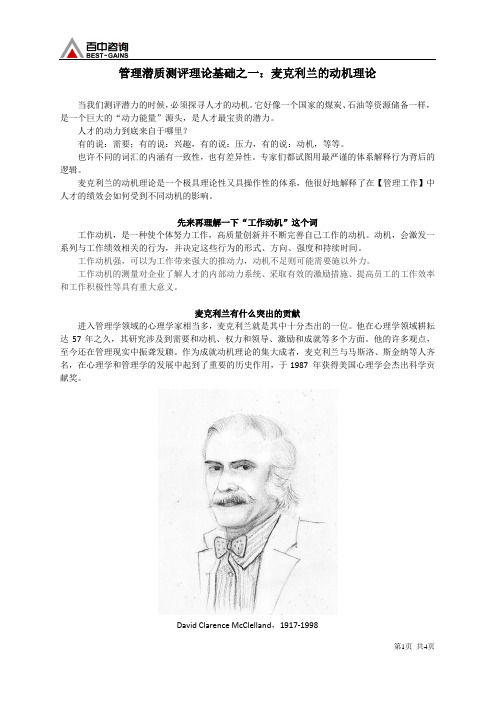
管理潜质测评理论基础之一:麦克利兰的动机理论当我们测评潜力的时候,必须探寻人才的动机。
它好像一个国家的煤炭、石油等资源储备一样,是一个巨大的“动力能量”源头,是人才最宝贵的潜力。
人才的动力到底来自于哪里?有的说:需要;有的说:兴趣,有的说:压力,有的说:动机,等等。
也许不同的词汇的内涵有一致性,也有差异性。
专家们都试图用最严谨的体系解释行为背后的逻辑。
麦克利兰的动机理论是一个极具理论性又具操作性的体系,他很好地解释了在【管理工作】中人才的绩效会如何受到不同动机的影响。
先来再理解一下“工作动机”这个词工作动机,是一种使个体努力工作,高质量创新并不断完善自己工作的动机。
动机,会激发一系列与工作绩效相关的行为,并决定这些行为的形式、方向、强度和持续时间。
工作动机强,可以为工作带来强大的推动力,动机不足则可能需要施以外力。
工作动机的测量对企业了解人才的内部动力系统、采取有效的激励措施、提高员工的工作效率和工作积极性等具有重大意义。
麦克利兰有什么突出的贡献进入管理学领域的心理学家相当多,麦克利兰就是其中十分杰出的一位。
他在心理学领域耕耘达57年之久,其研究涉及到需要和动机、权力和领导、激励和成就等多个方面。
他的许多观点,至今还在管理现实中振聋发聩。
作为成就动机理论的集大成者,麦克利兰与马斯洛、斯金纳等人齐名,在心理学和管理学的发展中起到了重要的历史作用,于1987 年获得美国心理学会杰出科学贡献奖。
David Clarence McClelland,1917-19981、麦克利兰的动机理论的特色之一,摆脱了精神分析和行为主义学派的局限性在麦克利兰之前,精神分析学派和行为主义学派的心理学家对动机进行过不同的研究。
精神分析学派以弗洛伊德为代表,他们用梦的解析、自由联想等方法来研究动机,将人们的行为动机归结于性和本能。
这种研究方法和技术的可重复性较差,并且难以得出有代表性的确切结论,也难以测量出动机的强度。
行为主义学派的心理学家以华生和斯金纳为代表,用实验的方法研究动机,回避了内心活动因素不可测量的难题,能够准确地发现行为和刺激物的关联,但由于动机是通过动物实验进行的,难免会把动机定义得过于狭窄。
动机理论和激励方法【外文翻译】
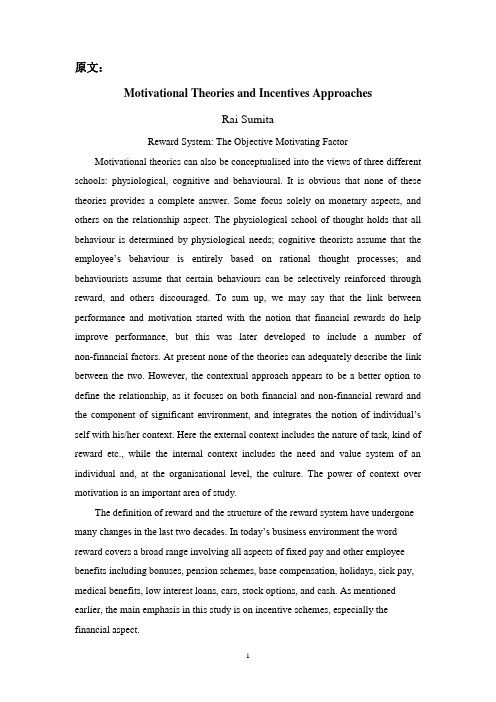
原文:Motivational Theories and Incentives ApproachesRai SumitaReward System: The Objective Motivating FactorMotivational theorics can also be conceptualised into the views of three different schools: physiological, cognitive and behavioural. It is obvious that none of these theories provides a complete answer. Some focus solely on monetary aspects, and others on the relationship aspect. The physiological school of thought holds that all behaviour is determined by physiological needs; cognitive theorists assume that the employee’s behaviour is entirely based on rational thought processes; and behaviourists assume that certain behaviours can be selectively reinforced through reward, and others discouraged. To sum up, we may say that the link between performance and motivation started with the notion that financial rewards do help improve performance, but this was later developed to include a number of non-financial factors. At present none of the theories can adequately describe the link between the two. However, the contextual approach appears to be a better option to define the relationship, as it focuses on both financial and non-financial reward and the component of significant environment, and integrates the notion of individual’s self with his/her context. Here the external context includes the nature of task, kind of reward etc., while the internal context includes the need and value system of an individual and, at the organisational level, the culture. The power of context over motivation is an important area of study.The definition of reward and the structure of the reward system have undergone many changes in the last two decades. In today’s business environment the word reward covers a broad range involving all aspects of fixed pay and other employee benefits including bonuses, pension schemes, base compensation, holidays, sick pay, medical benefits, low interest loans, cars, stock options, and cash. As mentioned earlier, the main emphasis in this study is on incentive schemes, especially the financial aspect.What Motivates an Employee?How can we get workers to be more productive? Management experts have tried to answer this question for several years. In the early part of the 20th Century, employees were considered just another input in the production of goods and services, but this view underwent a drastic change after the publication of the Hawthorne Studies, where Elton Mayo pointed out that employees are motivated not only by money, and that employee behaviour is related to other behaviour. Studies conducted in this area show that ‘interesting work’ is one of the most important criteria for hard work. Creating interesting work might be a challenge for organisations but at the individual level employees would certainly be more productive if the work were interesting. This raises the question, is it possible to make all the work in organizations interesting? Unfortunately, this does not appear to be feasible, partly because what is interesting to one person may not be interesting to another.In this connection several cross-cultural studies also reported that interesting and challenging work inspires people to perform more than what is required of them. They exert additional effort in order to experience a sense of fulfilling their potential and accomplishing worthwhile ends. There are certain qualities attached with intrinsically motivated employees such as greater concern with the expressive aspects of work, and less with financial rewards. Some cross-cultural studies noted that while young people in the Far and Middle East differed from those in North and South America, the major determinant of particular behaviour is the situation. Situation plays an important role and motivation varies over time and situation. Kovach’s study shows that younger workers with low incomes in non-supervisory positions were most concerned with money while older workers with higher incomes and higher organizational positions were motivated more by the work and its quality.Recognition or appreciation for work done involves positive feedback, which helps improve the performance of employees. The rules of feedback follow the principles advocated in reinforcement theory. But in the last decade, good wages have taken the centre stage. All employees, regardless of gender, occupation, age, and income or employment status generally value it. To be noted however is that thestudies cited here are specific to developed countries like the US and the UK. There is to date no proper survey based study conducted in Indian setting to identify the factors that motivate employees to work hard. Demographic factors play a crucial role in levels of motivation. Individuals at different organizational levels, in different environments may have different motivational values. Hence, there is a need to take a look at income level and other demographic factors when analysing attitude for motivational purposes. Even in the era of globalization, where diverse workforces are common, people still carry some aspects from their culture and societal beliefs, which partially explains such variations in behaviour as the Japanese preference for collective recognition.Incentive SchemesIncentives are a special form of reward that encourage and stimulate employees to produce the desired behaviour. There are contrary views on the linkage of incentive and performance. While some researchers assert the significant positive impact of incentives on motivation, others refute it. Some management experts argue that money only motivates people who are already motivated. Opponents of the use of incentives point to the fact that countries like Germany, Japan and Sweden, where incentives programmes are not in use, produce quality goods and services. They argue that incentives are demanding and manipulative, create competition within the firm and divide employees, and distract employees from the importance of their work. It is also difficult to reward on the basis of individual performance because measurement of individual performance is only possible in the rare cases when the work that an individual does is independent of others. In most software companies, for instance, the emphasis is on teamwork spanning a cross section of technologies and businesses.According to Kohn, rewards by and large succeed in securing only temporary compliance, and do not create an enduring commitment to any value or actions. Bribes in the workplace simply cannot work because pay is not a motivator and rewards punish, rupture relationships, ignore reasons, discourage risk-taking, and undermine interest. Similarly, Herzberg holds that fear and coercion cannot create or increase motivation, and that KITA may produce a kind of movement but cannotcreate motivation.In a classic study of incentive-pay plans, W F Whyte pointed out that individuals who believed that incentives are important to motivation tend to be loners who do not join group activities. They believe that money making is a mark of virtue because it is a sign that they work hard.Other researchers have found evidence that rewards influence employee motivation and satisfaction, and play an important role in attracting the right employees, encouraging these employees to develop the critical skills and knowledge and finally retaining those employees for the future success of the organisation. In a competitive, consumerist globalised environment, the number of firms competing for excellent employees especially in knowledge-based industries is constantly increasing, and it is imperative to retain high performers by rewarding them.Incentive schemes are established with the objective of improving performance through fulfilling the needs of the employees. The importance of rewards could be high or low, depending on the context. Employees who are at the stage of struggling to fulfill basic needs would prefer cash rewards, while those who are a little more comfortable will tend to seek reward and recognition in the form of ‘satisfaction income’ – appreciation, interesting work, freedom to work, empowerment. In order to reap the full benefits of the reward system it is imperative to ensure good processes that are fair, equitable, appropriate and relative to the market place.Financial IncentivesThere are many methods of relating the performance of employees directly to their remuneration. It has been found that performance related remuneration has been partially useful in the context of some developed countries. Hume has reported that 78.5% of the organisations surveyed believed that PRR motivates employees and provides a better scope of the notion of social equity, and operated at least one system of PRR. Hume has also reported that financial reward had a great effect on employee performance in the UK and some other countries. Payment by results, profit sharing, gain sharing, commission, and ESOP are some of the commonly used forms of PRR.Base pay, as opposed to payment by results, is the traditional regular income thatpeople receive for their contribution. It follows the principle of rewarding employees according to their role and designation. In this method, individual accountability for receiving a reward is very low. Today, companies everywhere are seeking ways to minimise base pay and increase the variable component of rewards in the pay, thereby controlling costs, achieving maximum performance and ensuring individual accountability. Thus, those who perform better will receive higher pay than those whose level of work is only average or below average.Organisations in some developed countries follow the merit pay system, either in the form of salary increases or in the form of a bonus. However, the efficacy of merit pay in boosting employee performance in developing countries like India has not been studied. Further, in western countries the budget of offering merit pay is very small. It is difficult to award an increase of above 5% individually without denying the pay increase of other people. Hence the actual range of merit increase could be so low as to be meaningless from the employee point of view.W Edwards Deming held that firms should not differentiate individual performance with merit increases. Such systems, he and some other researchers believe, emphasise individual performance, even though individuals are rarely responsible for quality problems. They argue that it is important to focus on systemic causes of low quality rather than individual performance and its relationship to quality. Since people expect their annual pay increase in any case, merit pay does not have a significant effect on motivation.ESOP and other equity-related programmes are also believed to improve the productivity of the firm and the motivation levels of employees. The effectiveness of ESOP and other stock based incentives may depend on the structure of the organisation. In a large organisation, it may be a better motivator for key level executives rather than the average level of employee, as the decisions of the top management level are reflected in the market. Though there are advantages to using ESOP, there are certain problems too. The value of the award basically depends on the performance of the firm in the eyes of investors. These kinds of rewards are basically designed to retain employees, because they lose out if they leave the organisation. Butthe effectiveness of the strategy is arguable. Companies like PeopleSoft, Intel, HP, and IBM have rejected this incentive programme. Recently Microsoft has stopped rewarding employee through ESOP.ConclusionAn attempt has been made in the present article to argue that among other things, motivation is crucial for good performance and hence it is important to study what motivates employees for better performance. There are two views regarding money as a motivator: some scholars favour the idea of motivating employees through financial reward whereas others advocate psychological rewards as more important to promote better performance. The literature indicates that good wages as well as appreciation of work done are important in the modern context.Different types of incentives come under financial motivation and it is important for an organisation to design good reward systems appropriate to its employees, and keeping in mind individual as well as organisational goals. Concerns of equity and fairness need to be addressed if the incentives are to prove an effective motivator for organisational growth.While there does not seem to be a clear-cut linkage between any particular method of financial incentive and employee performance (and organisational performance), it is clear that financial incentives do have a significant influence on the motivation level, from worker to CEO. The level and the form could be different but their importance in the present scenario cannot be denied. In the words of Drucker, ‘There is not one shred of evidence that people have taken the turning away from material rewards…anti-materialism is a myth, no matter how much it is extolled, economic incentives are becoming rights rather than rewards.’(节选)IIMB Management Review (Indian Institute of Management Bangalore),Dec2004,V ol.16 Issue 4,p43-50,8p,3 Charts.译文:动机理论和激励方法Rai Sumita奖励系统:目标激励因素动机理论也能运用在三种不同的领域:心理、认知和行为。
the theory of motivated reasoning suggests
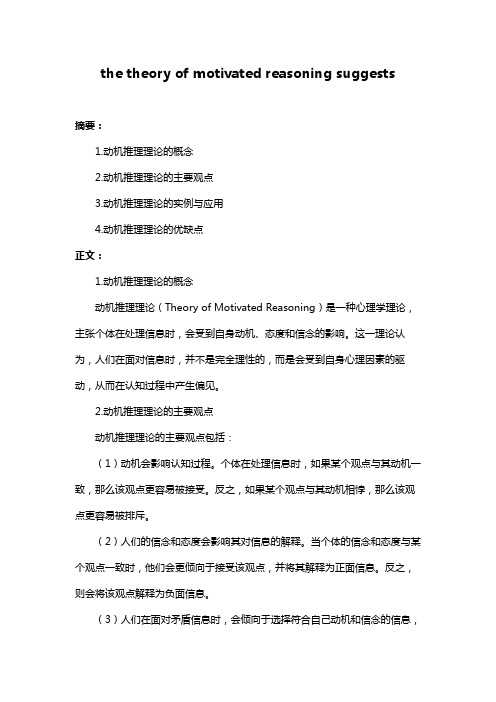
the theory of motivated reasoning suggests摘要:1.动机推理理论的概念2.动机推理理论的主要观点3.动机推理理论的实例与应用4.动机推理理论的优缺点正文:1.动机推理理论的概念动机推理理论(Theory of Motivated Reasoning)是一种心理学理论,主张个体在处理信息时,会受到自身动机、态度和信念的影响。
这一理论认为,人们在面对信息时,并不是完全理性的,而是会受到自身心理因素的驱动,从而在认知过程中产生偏见。
2.动机推理理论的主要观点动机推理理论的主要观点包括:(1)动机会影响认知过程。
个体在处理信息时,如果某个观点与其动机一致,那么该观点更容易被接受。
反之,如果某个观点与其动机相悖,那么该观点更容易被排斥。
(2)人们的信念和态度会影响其对信息的解释。
当个体的信念和态度与某个观点一致时,他们会更倾向于接受该观点,并将其解释为正面信息。
反之,则会将该观点解释为负面信息。
(3)人们在面对矛盾信息时,会倾向于选择符合自己动机和信念的信息,从而维持自我认知的一致性。
3.动机推理理论的实例与应用动机推理理论在现实生活中有许多实例,例如:(1)政治立场:人们在面对政治议题时,往往会选择接受符合自己政治立场的信息,从而维持自我认知的一致性。
(2)消费行为:消费者在购买商品时,往往会受到自己消费动机的影响,如追求性价比、追求品牌等。
(3)人际关系:人们在处理人际关系时,往往会受到自己的动机和信念的影响,从而对别人的行为产生偏见。
4.动机推理理论的优缺点动机推理理论的优点在于,它揭示了人们在处理信息时,并非完全理性,而是受到自身动机和信念的影响。
这有助于我们更好地理解人类的认知过程。
然而,动机推理理论也存在缺点。
首先,它过于强调动机和信念对认知过程的影响,忽视了其他因素,如认知能力、知识结构等。
- 1、下载文档前请自行甄别文档内容的完整性,平台不提供额外的编辑、内容补充、找答案等附加服务。
- 2、"仅部分预览"的文档,不可在线预览部分如存在完整性等问题,可反馈申请退款(可完整预览的文档不适用该条件!)。
- 3、如文档侵犯您的权益,请联系客服反馈,我们会尽快为您处理(人工客服工作时间:9:00-18:30)。
Contents of this page include:∙Maslow∙Hertzberg∙Elton Mayo∙Handy∙Mcgregor theory X and Y∙Ouchi theory Z∙Lean and mass productionMaslow’s hierarchy of needs:Maslow showed how an individual’s emphasis on needs moved from basic to the higher needs. The needs at the bottom must be satisfied to move at the higher ones. Needs do not have to be completely satisfied before higher needs emerge, a sufficient level of satisfaction is acceptable as opposed to the maximum or optimum level.Maslow’s theory may be summarized and simplified by saying that everyone wants certain things throughout life, and these things can be placed in five ascending categories namely:Basic or physiological needs: the things needed to stay alive: food, shelter and clothing. Such needs can be satisfied by money.Safety or security needs: people want protection against, unemployment, retirement as well as being safeguarded against unfair treatment. These needs can be satisfied by the rules of employment i.e pension scheme, sick fund, employment legislation.Social needs: the vast majority of people want to be part of a group and it is only through group activity that this need can be satisfied. Thus it is up to the organization to make the employee feel part of a group.Ego or Esteem needs: e.g. can include employee being asked to lead a group in a project. This enables the employee to think well of himself and in his abilities. This can be satisfied if the say or suggestion of the employee is taken into account and/or he is asked to lead or be part of an important task. Self-actualization or self-fulfillment needs: this is quite the need to achieve something worthwhile in life. It is a need that is satisfied only by continuing success, for example opening and running a new office. EVALUATION OF MASLOW:The significance of maslow’s hierarchy of needs is that if underlines the relative importance of money. Status gives little satisfaction to a person desperate for food and shelter.On the other hand it demonstrates that money alone is not enough, and indeed as basic needs are satisfied people are likely to concentrate their attentions on social and ego needs.Herzberg’s theory of motivation:Herzberg attempted to find out what motivated people at work. He developed the two-factor theory that was based on the idea that motivation is based on two needs, namely hygiene factors and motivational factors. Hygiene factors: are those that have to do with non-job related features such as the working environment.Motivational factors: are those concerned with a need for personal development.Hygiene factors: factors that need to be met to prevent dissatisfaction. Will not motivate in themselves, they are concerned with extrinsic factors associated with the job itself but are not directly a part of it. The important fact to remember is that attention to these hygiene factors prevents dissatisfaction but does not necessarily provide positive motivation.∙Pay∙Conditions∙Company policy∙Relationships with higher levels, such as management∙Treatment at work∙Inability to develop∙Feelings of inadequacyMotivators: factors which motivate: the main motivation factor are not in the environment but in the intrinsic value and satisfaction gained from the job itself. Motivation factors include:∙Sense of achievement∙Chance of promotion∙Chance of improvement∙Recognition of effort∙Responsibility∙Nature of job itselfElton Mayo (Hawthorne Studies)Mayo’s most important contribution was to identify the basis of work satisfaction as non-economic and to connect it more with the interest taken in the worker’s performance than with the financial reward.Okay here’s what happened in plain simple words:∙ A test was conducted on 6 women which lasted for five years∙The test was conducted so as to observe the effect on output and morale of various changes in working conditions.∙Initially, an incentive payment scheme was introduced; then rest periods in different forms. Changes were made in the hours of work etc.∙CONCLUSION: it was found that whatever changes were made including a return to the original conditions, output still rose!∙The output recorded over time kept on increasing.Evaluation: it was apparent that the changes in working conditions could not account for the increase in output –this was due to the enhanced work satisfaction that the girls enjoyed, the development of personal friendships, and a new social atmosphere, which brought a marked change in their attitude towards work.Mcgregor’s theories:Theory X: assumes that people dislike work and responsibility. Therefore they must be coerced, controlled, directed or threatened with punishment to get them to make an effort towards achievement of organizational objectives. However modern employment laws have made this difficult for managers.For this reason a ‘carrot’ approach is used. People have to be persuaded to carry out tasks by promises or rewards. In many ways this is similar to Taylor’s view.Theory Y: assumes that most people are motivated by those things at the top of Maslow’s hierarchy. In other words, people are responsible, committed and enjoy having control over work. Most people, given the opportunity, will get involved in work and contribute towards the solution of a problem that may arise.IN OTHER WORDS:THEORY X is pessimistic and rigid. Control is primarily external i.e. imposed on the subordinate by the superior.THEORY Y is optimistic, dynamic and flexible, with an emphasis o self-direction and the integration of individual needs with organizational demands.Ouchi theory ZIn theory Z there is an emphasis on the interpersonal skills that form the basis of group working, where decision making is by consensus, but responsibility remains with the individual.There is emphasis on building trust through informal and democratic relationships.The characteristics of the theory z organizations are:∙Long term employment∙Slow evaluation and promotion∙Moderately specialized careers∙Consensual decision making∙Individual responsibility- this could mean giving greater responsibility lower down the line∙Concern for the employeeLEAN PRODUCTIONLean production is divided into the following sectors:∙Kaizen∙Just in time manufacturing∙Time based management∙Empowerment∙TeamworkingKaizen is perhaps the most concept in Japanese management. It means continuous improvement. In western businesses productivity remains the same for long periods of time, then suddenly rises. The increase is followed by another period of stability, before another rise. Increases in productivity may result from new working practices or new technology. The dotted line below shows the Japanese approach. Improvements are continuous. They result from changes in production techniques.the kaizen is said to be an umbrella concept. A wide range of different production techniques and working practices must be carried out for it to be effective. These include:∙Zero defect policies∙Total quality management∙Quality control circles∙Automation∙Just in timeIt is difficult for workers in the business to look for continuous improvement all the time. In order to solve this problem a system was introduced namely PDCA (plan, do, check, action)Plan: business must identify where improvement is needed. Data must be gathered and used to develop a plan which will result in improvement. Do: once the plan has been finalized it must be carried out.Check: the next stage in the cycle is to check whether or not there has been an improvement.Action: if the plan has been successful, it must be introduced in all parts of the business.Just in time manufacturing:JIT: just in time manufacturing is an important part of lean production. It is defined as for example in any manufacturing and selling organization: ‘raw materials being delivered JIT to be made into parts, parts were delivered JIT to be made into goods and goods were produced and delivered JIT to be sold.’Advantages:∙It improves cash flow as money is not tied up in stock∙The system reduces waste∙Since no stock is held the excess factory space can be used for something else∙Links with and the control of suppliers is improvedDisadvantages:∙ A lot of faith is placed in the reliability and flexibility of suppliers∙Increased order costs∙Advantages of bulk discounts is lost∙Difficult to cope up with sharp increases in demandTime-based management:Time based mgt involves reducing the amount of time businesses take carrying out certain tasks, such as launching new products or cutting lead times in production. Time based mgt is a feature of lean production because it involves eliminating a type of waste i.e. time.Advantages:∙Customers will benefit. A wider range of products will be available and there will be faster delivery times.∙Increased efficiency will benefit the compan y by improving it’s image in the eyes of the people∙The time spent on range of production tasks is reduced. This helps to improve productivity and reduce unit costs.Empowerment:Empowerment involves giving employees the power to make decisions in a business. The aim of empowerment is to give employees more control over their own work conditions.Businesses have now learnt that efficiency will improve if workers are given the opportunity to involve themselves in decision making. Workers will be better motivated and the business may gain from the creativity of its workers. Empowerment is not without difficulties. Some workers may not be able to make their own decisions and training may be required to teach them such skills. Mangers may resent giving up authority. Some staff may even abuse their power to make decisions.Team working:A growing number of businesses are introducing team working. This involves dividing the workforce into fairly small groups. Each team will focus on particular areas of production and team members will have the same common aims.Effective teamworking requires cooperation between workers and management. Both the business and employees can benefit from team working. Workers should develop relationships with colleagues and a team spirit which may improve motivation and productivity. Flexibility will improve. For example team members might be more willing to cover for an absent colleague.MASS production。
